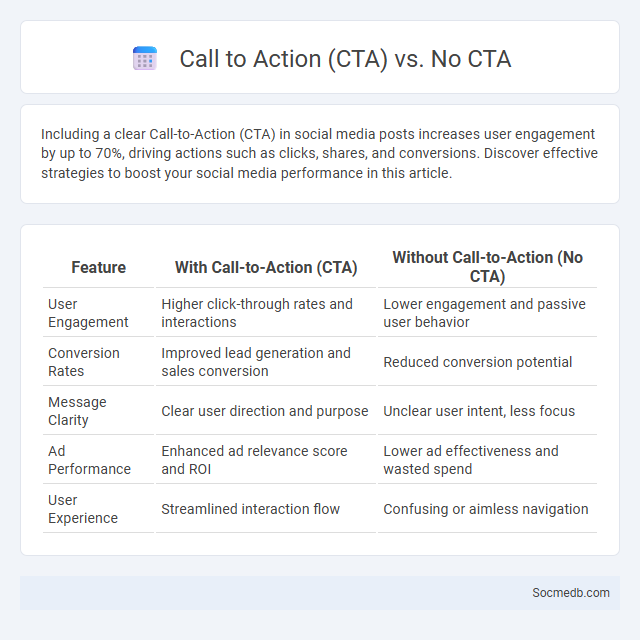
Photo illustration: Call-to-Action (CTA) vs No CTA
Including a clear Call-to-Action (CTA) in social media posts increases user engagement by up to 70%, driving actions such as clicks, shares, and conversions. Discover effective strategies to boost your social media performance in this article.
Table of Comparison
| Feature | With Call-to-Action (CTA) | Without Call-to-Action (No CTA) |
|---|---|---|
| User Engagement | Higher click-through rates and interactions | Lower engagement and passive user behavior |
| Conversion Rates | Improved lead generation and sales conversion | Reduced conversion potential |
| Message Clarity | Clear user direction and purpose | Unclear user intent, less focus |
| Ad Performance | Enhanced ad relevance score and ROI | Lower ad effectiveness and wasted spend |
| User Experience | Streamlined interaction flow | Confusing or aimless navigation |
Understanding Call-to-Action (CTA): Definition and Purpose
A Call-to-Action (CTA) in social media is a strategic prompt designed to encourage Your audience to take a specific action, such as liking, sharing, commenting, or clicking a link. Effective CTAs drive user engagement, increase conversions, and guide potential customers through the sales funnel. Understanding the definition and purpose of CTAs enables You to craft compelling messages that boost interaction and achieve marketing goals.
The Power of No CTA: When Silence Speaks Volumes
The power of no CTA on social media lies in its ability to create curiosity and engagement by letting content speak for itself without direct prompts. This approach enhances organic interaction, encouraging followers to form genuine connections and share thoughts naturally. Brands leveraging silence effectively often experience increased trust and authentic follower loyalty.
What Makes Content Go Viral? Key Elements Explained
Viral content on social media thrives on emotional resonance, relatability, and shareability, often incorporating humor, surprise, or strong storytelling to captivate audiences. High engagement rates, including likes, comments, and shares, amplify visibility through platform algorithms that prioritize trending posts. Timeliness and relevance to current events or popular culture significantly boost the chances of content going viral by tapping into collective conversations.
CTA vs No CTA: Psychological Impact on Audiences
Social media posts with clear Calls to Action (CTA) significantly increase user engagement by triggering a psychological response rooted in the principle of commitment and consistency. Audiences exposed to CTA-driven content exhibit higher click-through rates and conversion due to the explicit invitation to participate or respond, reinforcing their sense of agency. In contrast, posts without CTAs often result in passive consumption, leading to lower interaction and diminished influence on audience behavior.
Engagement Rates: CTA-Driven Content vs Viral Trends
Engagement rates on social media vary significantly between CTA-driven content and viral trends, with CTA-driven posts typically generating higher quality interactions by prompting users to take specific actions such as comments, shares, or clicks. Viral trends often achieve rapid reach and a surge in impressions but may lack sustained user engagement or meaningful conversion metrics. Your social media strategy should balance timely participation in viral trends while consistently delivering CTA-focused content to maximize long-term engagement and measurable results.
Conversion Optimization: Leveraging CTAs Effectively
Leveraging CTAs effectively on social media significantly boosts conversion optimization by guiding your audience toward specific actions, such as signing up, purchasing, or sharing content. Clear, compelling CTAs increase engagement rates and drive targeted traffic, making your campaigns more impactful and measurable. You can optimize conversions by strategically placing CTAs within posts, stories, and ads to match user intent and platform behavior.
Harnessing Viral Content Without Relying on CTAs
Creating viral social media content requires understanding audience psychology and trends to evoke genuine emotion and engagement. Crafting relatable stories, leveraging humor, and tapping into current cultural moments can drive shares and organic reach without explicit calls to action. Optimizing content for platform-specific algorithms and encouraging authentic interactions enhances virality while maintaining a natural user experience.
Metrics that Matter: Measuring Success Across Approaches
Tracking key social media metrics such as engagement rate, click-through rate, and conversion rate provides actionable insights into campaign performance. Analyzing audience demographics, sentiment analysis, and reach helps tailor content strategies to maximize impact. Leveraging platform-specific analytics tools ensures accurate measurement of success across diverse social media approaches.
Case Studies: Brands Using CTA, No CTA, and Viral Strategies
Brands employing clear Calls to Action (CTAs) on social media see up to a 70% increase in engagement, as demonstrated by case studies from top companies like Nike and Apple. In contrast, brands without CTAs often experience lower click-through rates, reducing conversion potential by over 30%. Your social media strategy can benefit by analyzing viral tactics used by brands such as Wendy's, which leverage humor and timely content to boost shares and brand visibility significantly.
Choosing the Right Approach: Strategy Recommendations
Selecting the right social media strategy hinges on understanding your target audience's preferences, behaviors, and platform usage patterns. Incorporate data-driven insights to tailor content types, posting schedules, and engagement methods that align with Your brand identity and business goals. Measure key performance indicators regularly to refine strategies and maximize reach, engagement, and conversions across channels.
 socmedb.com
socmedb.com